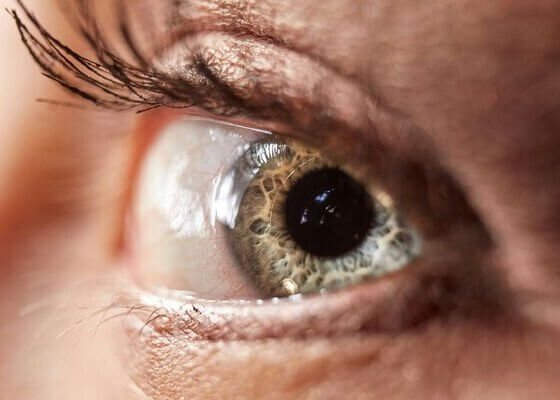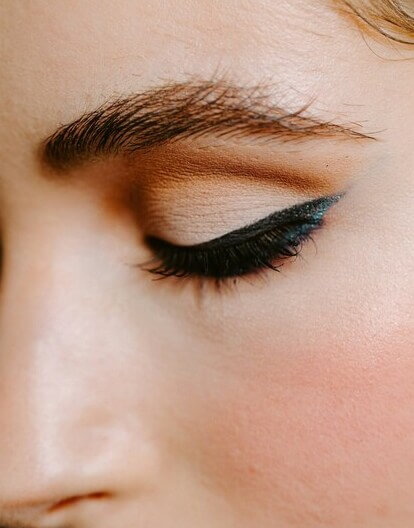Aging is a natural part of life, but it often comes with changes in the skin that can lead to increased sensitivity. This is especially true for delicate areas like your eyelids. As you age, you might notice your skin becoming more reactive to products, environmental factors, and even stress. Let’s explore how these natural changes contribute to sensitive eyelids and what you can do to keep your skin feeling comfortable and protected.

Aging Skin: How Natural Changes in the Skin Contribute to Sensitivity
Thinning Skin: A Common Culprit
One of the most significant changes in aging skin is thinning. As you age, the skin’s natural production of collagen and elastin—proteins responsible for keeping your skin firm and elastic—begins to slow down. This reduction leads to a gradual thinning of the skin, making it more fragile and susceptible to irritation.
For your eyelids, this thinning can be particularly problematic. The skin around your eyes is already the thinnest on your body, so any further thinning can exacerbate sensitivity. You might notice your eyelids feeling more delicate, reacting more strongly to makeup, or even becoming dry and flaky. This thinning can also make the blood vessels under the skin more visible, leading to dark circles and puffiness, which can add to the discomfort.
To combat this, focus on gentle skincare products that support collagen production and keep your skin hydrated. Look for ingredients like hyaluronic acid and peptides, which help maintain moisture and support skin elasticity. Avoid harsh chemicals or heavy makeup that can further irritate your sensitive eyelids.
Decreased Oil Production: The Drying Effect
Another natural change that occurs as you age is a decrease in the skin’s oil production. Sebum, the natural oil your skin produces, helps to keep your skin moisturized and acts as a barrier against environmental irritants. However, as you get older, your sebaceous glands become less active, leading to drier skin.
This reduction in oil production can significantly impact your eyelids, making them feel dry and tight. Dry skin is more prone to irritation and can become flaky or even cracked, contributing to the overall sensitivity of the area. You might find that products you once loved now cause discomfort, or that your skin becomes more easily inflamed.
To address this, incorporate nourishing, hydrating products into your skincare routine. Opt for gentle, fragrance-free moisturizers and consider using an eye cream specifically formulated for sensitive skin. These products can help replenish moisture and protect your skin from further irritation. Don’t forget to stay hydrated by drinking plenty of water, as internal hydration is just as important as what you apply topically.
Loss of Skin Barrier Function: Increased Vulnerability
As you age, your skin’s natural barrier—the outermost layer that protects against environmental aggressors—begins to weaken. This loss of barrier function makes your skin more vulnerable to irritants like pollution, allergens, and harsh weather conditions. Your eyelids, already delicate, become even more prone to sensitivity as they lose some of their protective capabilities.
This compromised barrier can lead to a range of issues, including redness, itching, and increased sensitivity to skincare products and cosmetics. You might find that your eyelids sting or burn when applying certain products or that they become inflamed after exposure to the sun or cold winds.
To strengthen your skin’s barrier, look for products containing ceramides and fatty acids, which help restore and maintain the skin’s natural defenses. Be cautious with exfoliants and avoid over-washing your face, as this can strip away the protective oils your skin needs. When choosing makeup, opt for hypoallergenic formulas designed for sensitive skin, and always remove makeup gently at the end of the day to avoid further irritation.
Hormonal Changes: The Sensitivity Trigger
Hormonal changes, particularly those that occur during menopause, can also play a significant role in increasing skin sensitivity. As estrogen levels decrease, so does the production of collagen and natural oils, leading to thinner, drier, and more reactive skin. These hormonal shifts can make your eyelids more sensitive to both internal and external factors, such as stress, diet, and environmental changes.
During this time, you might notice that your skin becomes more unpredictable, reacting to products or conditions that never caused problems before. This heightened sensitivity can be frustrating, especially when you’re trying to maintain a consistent skincare routine.
To manage hormone-related skin sensitivity, consider using skincare products specifically designed for mature skin. These products often contain ingredients that help balance the skin’s needs, providing hydration and support for the skin barrier. Additionally, maintaining a healthy diet, managing stress, and getting enough sleep can help mitigate some of the sensitivity triggered by hormonal changes.
Embrace Your Skin’s Natural Journey
As your skin ages, it’s natural to experience increased sensitivity, especially around delicate areas like your eyelids. Understanding the changes that contribute to this sensitivity—such as thinning skin, decreased oil production, loss of barrier function, and hormonal shifts—can help you make informed choices about your skincare routine.
By opting for gentle, hydrating products and being mindful of the specific needs of your aging skin, you can maintain comfort and health. Remember, your skin’s journey is unique, and embracing these changes with the right care can keep you looking and feeling your best. After all, sensitive eyelids are just one part of the beautiful story your skin has to tell.
Allergic Reactions: Identifying and Avoiding Allergens that Affect the Eyelids

Understanding Eyelid Sensitivity
Eyelids are incredibly delicate, and it’s no wonder they can be prone to allergic reactions. When your eyelids start itching, swelling, or turning red, it’s often a sign that something in your environment isn’t agreeing with them. Your skin might be trying to tell you that it’s sensitive to something you’re using or encountering daily. Identifying and avoiding these allergens is key to keeping your eyelids comfortable and healthy.
Common Allergens to Watch Out For
Many common allergens can cause your eyelids to react, and sometimes, they’re hiding in plain sight. Cosmetics like eyeshadows, mascaras, and eyeliners are often culprits, especially if they contain fragrances or preservatives. Even your favorite skincare products might be to blame if they have ingredients your skin doesn’t tolerate well. Sometimes, it’s not the product itself but how old it is. Expired makeup or skincare can harbor bacteria, triggering a reaction. Watch out for products that are past their prime, and always check the ingredient list for potential irritants.
Avoiding Allergens in Your Routine
So, how do you avoid allergens while still enjoying your beauty routine? Start by simplifying your skincare and makeup regimen. Opt for products labeled hypoallergenic, fragrance-free, and specifically designed for sensitive skin. When trying a new product, do a patch test on a small area of skin before applying it to your eyelids. This way, you can catch any potential reactions early. Also, consider switching to natural or organic products with fewer synthetic ingredients. While these aren’t always foolproof, they can be gentler on sensitive eyelids.
What to Do When a Reaction Strikes
If you notice your eyelids reacting, the first step is to stop using any new products immediately. Wash your face with a gentle, fragrance-free cleanser to remove any potential allergens. Applying a cold compress can help soothe irritation and reduce swelling. Over-the-counter hydrocortisone creams can also provide relief, but use them sparingly and only after consulting a healthcare provider. If the reaction is severe or doesn’t improve, it’s best to see a dermatologist. They can help pinpoint the allergen and recommend treatments to calm your sensitive eyelids.
The Role of Environmental Allergens
It’s not just your beauty products that can cause problems—environmental allergens can also wreak havoc on your eyelids. Pollen, dust mites, pet dander, and even certain foods can trigger reactions. If you notice your symptoms worsening during specific times of the year, like spring or fall, seasonal allergies might be to blame. Try to minimize exposure by keeping windows closed on high-pollen days, using air purifiers, and washing your bedding regularly. If pet dander is the issue, keeping pets out of the bedroom and washing your hands after petting them can help prevent flare-ups.
Taking Control of Your Eyelid Health
Managing sensitive eyelids might seem challenging, but with a little care, you can avoid most allergens and keep your skin happy. Pay attention to what your skin is telling you, and don’t be afraid to tweak your routine as needed. With the right products and a bit of awareness, you can enjoy a comfortable, irritation-free life—even with sensitive eyelids. Remember, your skin’s needs can change over time, so stay flexible and willing to adapt your routine to keep those pesky allergic reactions at bay.
Hormonal Changes: The Impact of Menopause on Sensitive Eyelids
Menopause brings about many changes, and your skin isn’t left out. One area often overlooked is your eyelids. Hormonal fluctuations during menopause can make your eyelids more sensitive, leading to discomfort and irritation. Understanding how these changes affect your skin, especially your eyelids, can help you manage sensitivity more effectively.

The Estrogen Effect on Skin
As you approach menopause, estrogen levels drop. This hormone plays a crucial role in keeping your skin hydrated and elastic. When estrogen decreases, your skin, including the delicate area around your eyes, loses moisture and collagen. This loss can lead to dryness, thinning skin, and increased sensitivity. You may notice your eyelids feeling more fragile, easily irritated, and prone to redness or itching.
To combat these changes, consider adding more moisture to your skincare routine. Opt for gentle, hydrating products designed for sensitive eyelids. Look for ingredients like hyaluronic acid and ceramides, which help lock in moisture and soothe irritation.
Increased Sensitivity During Menopause
With the hormonal rollercoaster of menopause, your skin may react more strongly to products that never bothered you before. Eyelid sensitivity can manifest as stinging, burning, or itching after applying certain cosmetics or skincare items. This is due to the thinning of your skin and the weakening of its protective barrier.
You might find that your usual eye creams or makeup start causing irritation. Switching to products labeled “hypoallergenic” or specifically designed for sensitive skin can make a significant difference. Pay attention to your skin’s reactions and don’t hesitate to adjust your routine to meet your changing needs.
Dealing with Dryness and Irritation
Menopause often brings about dryness, which can make your eyelids more prone to irritation. The delicate skin around your eyes has fewer oil glands, making it more susceptible to dryness. During menopause, this lack of natural oil becomes even more pronounced, leading to rough, flaky, or itchy eyelids.
To alleviate this, incorporate a nourishing eye cream or serum into your skincare routine. Choose products with soothing ingredients like aloe vera or chamomile. Applying a cool compress can also help reduce inflammation and discomfort, providing immediate relief to irritated eyelids.
Protecting Your Eyelids
As your skin changes during menopause, it’s important to protect your eyelids from further irritation. Sun exposure, harsh weather, and environmental pollutants can all exacerbate sensitivity. Wearing sunglasses and using a broad-spectrum sunscreen can help shield your delicate eyelid skin from damage.
Additionally, avoid rubbing your eyes, which can irritate already sensitive eyelids. Instead, gently pat any products onto your skin, and use a light touch when applying makeup. If possible, choose products that are free of fragrances, dyes, and other potential irritants to reduce the risk of triggering sensitivity.
Menopause can be a challenging time for your skin, but with the right care, you can manage eyelid sensitivity effectively. By understanding how hormonal changes impact your skin and adjusting your routine accordingly, you can keep your eyelids comfortable and healthy during this transitional phase.
Skincare Routine Missteps: Common Skincare Mistakes that Can Irritate Sensitive Eyelids
Overusing Harsh Cleansers
You might think a squeaky-clean face is the goal, but overusing harsh cleansers can strip your skin of its natural oils. This can leave your eyelids feeling tight, dry, and more prone to irritation. For sensitive eyelids, you’ll want to stick with gentle, fragrance-free cleansers. If your eyelids feel dry or sting after washing, it’s a sign that your cleanser might be too strong. You don’t need to scrub your face into submission—a light, gentle cleanse is all you need.

Skipping the Patch Test
We’ve all been there—excited to try a new skincare product and skipping the patch test. But for sensitive eyelids, this step is crucial. Even products labeled as “gentle” or “hypoallergenic” can contain ingredients that irritate your skin. A patch test can save you from a week of red, puffy eyelids. Just dab a small amount on your inner arm or behind your ear and wait 24 hours. If there’s no reaction, it’s likely safe for your sensitive eyelids. Better safe than sorry!
Ignoring Expiry Dates
When was the last time you checked the expiry dates on your skincare products? If you can’t remember, it’s time to take a look. Expired products can harbor bacteria, leading to infections and irritation, especially on sensitive eyelids. Toss anything past its prime, even if you haven’t finished the bottle. Using expired products is a big no-no for sensitive skin, and your eyelids deserve only the freshest care.
Rubbing Your Eyes
It’s tempting to rub your eyes when they’re tired or itchy, but this habit can wreak havoc on sensitive eyelids. Rubbing can break down the skin’s barrier, leading to dryness, irritation, and even fine lines. Instead, try a cold compress or soothing eye drops to relieve discomfort. Treat your eyelids with the gentle care they deserve, and you’ll notice a big difference in how they feel.
Overloading on Products
In the quest for perfect skin, it’s easy to go overboard with products. But layering too many can overwhelm your skin, particularly the delicate eyelid area. This can cause redness, flakiness, and sensitivity. Stick to a simple routine with a few well-chosen products that work well together. Less really is more when it comes to caring for sensitive eyelids. Your skin will thank you for the break!
Using Fragranced Products
Fragrances can make products smell divine, but they’re often a culprit behind irritation, especially for sensitive eyelids. Fragranced products might seem harmless, but the chemicals used for scent can irritate your skin. Opt for fragrance-free versions whenever possible. You’ll still get all the benefits without the added risk of irritation. Your eyelids will appreciate the fragrance-free love!
Skipping Moisturizer
You might think oily skin doesn’t need moisturizer, but skipping this step can actually make sensitive eyelids worse. Dryness is a common issue that can lead to irritation and discomfort. Choose a lightweight, hydrating moisturizer that’s gentle on your skin. Applying it regularly can help keep your eyelids smooth, hydrated, and irritation-free. Don’t skip the moisturizer—your eyelids need the moisture boost!
Using the Wrong Eye Makeup
Your favorite eye shadow might look stunning, but it could be the cause of your eyelid irritation. Many eye makeup products contain ingredients that aren’t friendly to sensitive skin. Opt for hypoallergenic or mineral-based makeup to minimize the risk of irritation. Removing your makeup thoroughly at the end of the day is equally important. Your eyelids will thank you for the extra care.
Applying Skincare Too Close to the Eyes
It’s easy to forget that not all skincare products are meant for the delicate eyelid area. Applying creams, serums, or oils too close to your eyes can cause irritation. This is especially true for products with active ingredients like retinoids or acids. Be mindful of where you apply your skincare, keeping it away from your eyelids unless it’s specifically formulated for the eye area. Less is more when it comes to applying products near sensitive eyelids.
By avoiding these common skincare mistakes, you can keep your sensitive eyelids comfortable, healthy, and irritation-free. Remember, a gentle approach and a little extra care go a long way in maintaining the delicate skin around your eyes. Treat your eyelids kindly, and they’ll repay you with a refreshed, irritation-free look!


